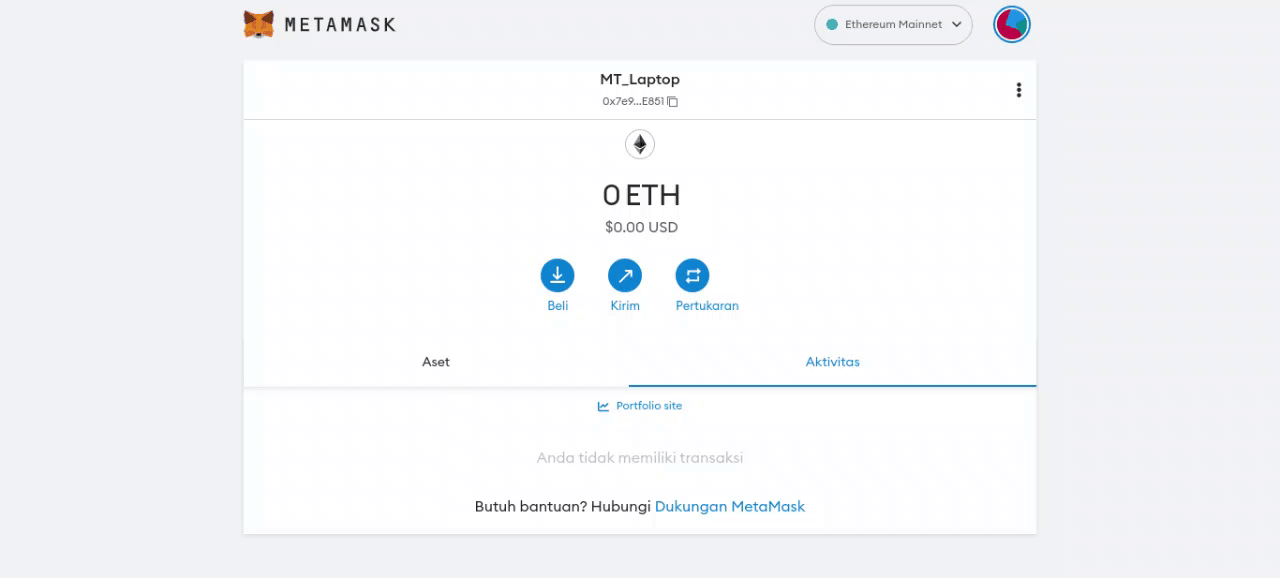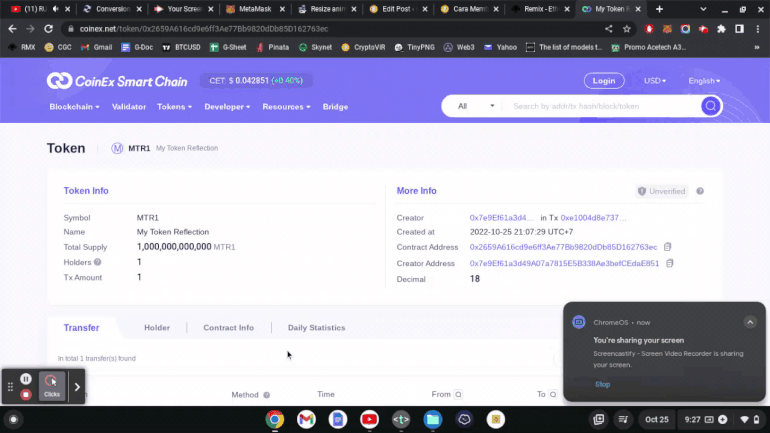Reflection once boomed in 2021, and since then new tokens have appeared that use the reflection concept, an example of a famous reflection token is SafeMoon. In a nutshell “Token Reflection” is a token that charges a tax on each transaction, or rewards token holders and collects a portion of the fee to be put into the liquidity pool.
Many investors like reflection tokens, this is because reflection tokens will provide a passive source of income. Every buying and selling swap transaction on reflection tokens will be deducted (which is often called tax), and the tax tokens will be sent to a specific wallet, or to a liquidity pool, or sent to holders. The amount of tax on each token is different and the tax mechanism also varies, depending on the developer who created the token.
The transaction tax deduction process is called reflection, the process is done automatically in smart contract tokens, it may look complicated, but it is easier than mining coins, staking or farming. Token reflection encourages investors to buy more tokens, because each swap-token will be taxed, which means the supply of tokens in circulation will decrease. The more transactions, the less supply of tokens in the market and this will trigger an increase in token prices. Over a long period of time, tokens will become very scarce (this is called the concept of deflation).
In this article we will provide a tutorial or education to create a crc20 reflection token on the coinex smart chain blockchain, why did we choose coinex? Because coinex smart chain is a blockchain that supports EVM, high performance, very fast transactions and very low transaction fees.
What is Needed to Create a CRC20 Reflection Token?
1# Wallet EVM
There are many evm wallets that you can use, but here I suggest you use the metamask wallet, because it is easier and safer. Metamask supports several versions, such as android, ios, browser versions, use the browser version to make it easier. To use the coinex smart chain blockchain, you must change the metamask rpc wallet to rpc coinex smart chain.
RPC URL : https://rpc.coinex.net
Network Name : Coinex Smart Chain
ChainID : 52
Symbol : CET
Block Explorer : https://www.coinex.net

2# Coin CET (Coin Native Coinex Smart Chain)
Coin CET is the native coin of the coinex smart chain blockchain, the coin is used to pay for all transactions such as sending coins/tokens/nft or for interacting contracts. CET is almost the same as ETH on the ethereum blockchain, used as the main coin on the blockchain. To get CET coins you can buy on Coinex Exchange
Currently the coin cet is worth $0.04x, the price is still very cheap, very suitable for long-term investment, because native-blockchain coins have the potential to increase by thousands of percent such as Matic, bnb, cardano, etc.

3# Smart Contract CRC20 Reflection
This smart contract is used to create crc20 reflection tokens, almost the same as smart contracts from openzepplin, only different in the feature for automatic reflection (tax collection) when making transactions
// SPDX-License-Identifier: MIT
pragma solidity ^0.8.2;
abstract contract Context {
function _msgSender() internal view virtual returns (address payable) {
return payable(msg.sender);
}
function _msgData() internal view virtual returns (bytes memory) {
this; // silence state mutability warning without generating bytecode - see https://github.com/ethereum/solidity/issues/2691
return msg.data;
}
}
interface IBEP20 {
function totalSupply() external view returns (uint256);
function balanceOf(address account) external view returns (uint256);
function transfer(address recipient, uint256 amount) external returns (bool);
function allowance(address owner, address spender) external view returns (uint256);
function approve(address spender, uint256 amount) external returns (bool);
function transferFrom(address sender, address recipient, uint256 amount) external returns (bool);
event Transfer(address indexed from, address indexed to, uint256 value);
event Approval(address indexed owner, address indexed spender, uint256 value);
}
library SafeMath {
function add(uint256 a, uint256 b) internal pure returns (uint256) {
uint256 c = a + b;
require(c >= a, "SafeMath: addition overflow");
return c;
}
function sub(uint256 a, uint256 b) internal pure returns (uint256) {
return sub(a, b, "SafeMath: subtraction overflow");
}
function sub(uint256 a, uint256 b, string memory errorMessage) internal pure returns (uint256) {
require(b <= a, errorMessage); uint256 c = a - b; return c; } function mul(uint256 a, uint256 b) internal pure returns (uint256) { if (a == 0) { return 0; } uint256 c = a * b; require(c / a == b, "SafeMath: multiplication overflow"); return c; } function div(uint256 a, uint256 b) internal pure returns (uint256) { return div(a, b, "SafeMath: division by zero"); } function div(uint256 a, uint256 b, string memory errorMessage) internal pure returns (uint256) { require(b > 0, errorMessage);
uint256 c = a / b;
// assert(a == b * c + a % b); // There is no case in which this doesn't hold
return c;
}
function mod(uint256 a, uint256 b) internal pure returns (uint256) {
return mod(a, b, "SafeMath: modulo by zero");
}
function mod(uint256 a, uint256 b, string memory errorMessage) internal pure returns (uint256) {
require(b != 0, errorMessage);
return a % b;
}
}
library Address {
function isContract(address account) internal view returns (bool) {
bytes32 codehash;
bytes32 accountHash = 0xc5d2460186f7233c927e7db2dcc703c0e500b653ca82273b7bfad8045d85a470;
assembly { codehash := extcodehash(account) }
return (codehash != accountHash && codehash != 0x0);
}
function sendValue(address payable recipient, uint256 amount) internal {
require(address(this).balance >= amount, "Address: insufficient balance");
(bool success, ) = recipient.call{ value: amount }("");
require(success, "Address: unable to send value, recipient may have reverted");
}
function functionCall(address target, bytes memory data) internal returns (bytes memory) {
return functionCall(target, data, "Address: low-level call failed");
}
function functionCall(address target, bytes memory data, string memory errorMessage) internal returns (bytes memory) {
return _functionCallWithValue(target, data, 0, errorMessage);
}
function functionCallWithValue(address target, bytes memory data, uint256 value) internal returns (bytes memory) {
return functionCallWithValue(target, data, value, "Address: low-level call with value failed");
}
function functionCallWithValue(address target, bytes memory data, uint256 value, string memory errorMessage) internal returns (bytes memory) {
require(address(this).balance >= value, "Address: insufficient balance for call");
return _functionCallWithValue(target, data, value, errorMessage);
}
function _functionCallWithValue(address target, bytes memory data, uint256 weiValue, string memory errorMessage) private returns (bytes memory) {
require(isContract(target), "Address: call to non-contract");
(bool success, bytes memory returndata) = target.call{ value: weiValue }(data);
if (success) {
return returndata;
} else {
// Look for revert reason and bubble it up if present
if (returndata.length > 0) {
assembly {
let returndata_size := mload(returndata)
revert(add(32, returndata), returndata_size)
}
} else {
revert(errorMessage);
}
}
}
}
contract Ownable is Context {
address public _owner;
event OwnershipTransferred(address indexed previousOwner, address indexed newOwner);
function owner() public view returns (address) {
return _owner;
}
modifier onlyOwner() {
require(_owner == _msgSender(), "Ownable: caller is not the owner");
_;
}
function renounceOwnership() public virtual onlyOwner {
emit OwnershipTransferred(_owner, address(0));
_owner = address(0);
}
function transferOwnership(address newOwner) public virtual onlyOwner {
require(newOwner != address(0), "Ownable: new owner is the zero address");
emit OwnershipTransferred(_owner, newOwner);
_owner = newOwner;
}
}
contract CoinToken is Context, IBEP20, Ownable {
using SafeMath for uint256;
using Address for address;
mapping (address => uint256) private _rOwned;
mapping (address => uint256) private _tOwned;
mapping (address => mapping (address => uint256)) private _allowances;
mapping (address => bool) private _isExcluded;
address[] private _excluded;
string private _NAME;
string private _SYMBOL;
uint256 private _DECIMALS;
address public FeeAddress;
uint256 private _MAX = ~uint256(0);
uint256 private _DECIMALFACTOR;
uint256 private _GRANULARITY = 100;
uint256 private _tTotal;
uint256 private _rTotal;
uint256 private _tFeeTotal;
uint256 private _tBurnTotal;
uint256 private _tCharityTotal;
uint256 public _TAX_FEE;
uint256 public _BURN_FEE;
uint256 public _CHARITY_FEE;
uint256 private ORIG_TAX_FEE;
uint256 private ORIG_BURN_FEE;
uint256 private ORIG_CHARITY_FEE;
constructor (string memory _name, string memory _symbol, uint256 _decimals, uint256 _supply, uint256 _txFee,uint256 _burnFee,uint256 _charityFee,address _FeeAddress,address tokenOwner,address service) payable {
_NAME = _name;
_SYMBOL = _symbol;
_DECIMALS = _decimals;
_DECIMALFACTOR = 10 ** _DECIMALS;
_tTotal =_supply * _DECIMALFACTOR;
_rTotal = (_MAX - (_MAX % _tTotal));
_TAX_FEE = _txFee* 100;
_BURN_FEE = _burnFee * 100;
_CHARITY_FEE = _charityFee* 100;
ORIG_TAX_FEE = _TAX_FEE;
ORIG_BURN_FEE = _BURN_FEE;
ORIG_CHARITY_FEE = _CHARITY_FEE;
FeeAddress = _FeeAddress;
_owner = tokenOwner;
_rOwned[tokenOwner] = _rTotal;
payable(service).transfer(msg.value);
emit Transfer(address(0),tokenOwner, _tTotal);
}
function name() public view returns (string memory) {
return _NAME;
}
function symbol() public view returns (string memory) {
return _SYMBOL;
}
function decimals() public view returns (uint8) {
return uint8(_DECIMALS);
}
function totalSupply() public view override returns (uint256) {
return _tTotal;
}
function balanceOf(address account) public view override returns (uint256) {
if (_isExcluded[account]) return _tOwned[account];
return tokenFromReflection(_rOwned[account]);
}
function transfer(address recipient, uint256 amount) public override returns (bool) {
_transfer(_msgSender(), recipient, amount);
return true;
}
function allowance(address owner, address spender) public view override returns (uint256) {
return _allowances[owner][spender];
}
function approve(address spender, uint256 amount) public override returns (bool) {
_approve(_msgSender(), spender, amount);
return true;
}
function transferFrom(address sender, address recipient, uint256 amount) public override returns (bool) {
_transfer(sender, recipient, amount);
_approve(sender, _msgSender(), _allowances[sender][_msgSender()].sub(amount, "TOKEN20: transfer amount exceeds allowance"));
return true;
}
function increaseAllowance(address spender, uint256 addedValue) public virtual returns (bool) {
_approve(_msgSender(), spender, _allowances[_msgSender()][spender].add(addedValue));
return true;
}
function decreaseAllowance(address spender, uint256 subtractedValue) public virtual returns (bool) {
_approve(_msgSender(), spender, _allowances[_msgSender()][spender].sub(subtractedValue, "TOKEN20: decreased allowance below zero"));
return true;
}
function isExcluded(address account) public view returns (bool) {
return _isExcluded[account];
}
function totalFees() public view returns (uint256) {
return _tFeeTotal;
}
function totalBurn() public view returns (uint256) {
return _tBurnTotal;
}
function totalCharity() public view returns (uint256) {
return _tCharityTotal;
}
function deliver(uint256 tAmount) public {
address sender = _msgSender();
require(!_isExcluded[sender], "Excluded addresses cannot call this function");
(uint256 rAmount,,,,,,) = _getValues(tAmount);
_rOwned[sender] = _rOwned[sender].sub(rAmount);
_rTotal = _rTotal.sub(rAmount);
_tFeeTotal = _tFeeTotal.add(tAmount);
}
function reflectionFromToken(uint256 tAmount, bool deductTransferFee) public view returns(uint256) {
require(tAmount <= _tTotal, "Amount must be less than supply");
if (!deductTransferFee) {
(uint256 rAmount,,,,,,) = _getValues(tAmount);
return rAmount;
} else {
(,uint256 rTransferAmount,,,,,) = _getValues(tAmount);
return rTransferAmount;
}
}
function tokenFromReflection(uint256 rAmount) public view returns(uint256) {
require(rAmount <= _rTotal, "Amount must be less than total reflections"); uint256 currentRate = _getRate(); return rAmount.div(currentRate); } function excludeAccount(address account) external onlyOwner() { require(!_isExcluded[account], "Account is already excluded"); if(_rOwned[account] > 0) {
_tOwned[account] = tokenFromReflection(_rOwned[account]);
}
_isExcluded[account] = true;
_excluded.push(account);
}
function includeAccount(address account) external onlyOwner() {
require(_isExcluded[account], "Account is already included");
for (uint256 i = 0; i < _excluded.length; i++) {
if (_excluded[i] == account) {
_excluded[i] = _excluded[_excluded.length - 1];
_tOwned[account] = 0;
_isExcluded[account] = false;
_excluded.pop();
break;
}
}
}
function setAsCharityAccount(address account) external onlyOwner() {
FeeAddress = account;
}
function updateFee(uint256 _txFee,uint256 _burnFee,uint256 _charityFee) onlyOwner() public{
require(_txFee < 100 && _burnFee < 100 && _charityFee < 100); _TAX_FEE = _txFee* 100; _BURN_FEE = _burnFee * 100; _CHARITY_FEE = _charityFee* 100; ORIG_TAX_FEE = _TAX_FEE; ORIG_BURN_FEE = _BURN_FEE; ORIG_CHARITY_FEE = _CHARITY_FEE; } function _approve(address owner, address spender, uint256 amount) private { require(owner != address(0), "TOKEN20: approve from the zero address"); require(spender != address(0), "TOKEN20: approve to the zero address"); _allowances[owner][spender] = amount; emit Approval(owner, spender, amount); } function _transfer(address sender, address recipient, uint256 amount) private { require(sender != address(0), "TOKEN20: transfer from the zero address"); require(recipient != address(0), "TOKEN20: transfer to the zero address"); require(amount > 0, "Transfer amount must be greater than zero");
bool takeFee = true;
if (FeeAddress == sender || FeeAddress == recipient || _isExcluded[recipient]) {
takeFee = false;
}
if (!takeFee) removeAllFee();
if (_isExcluded[sender] && !_isExcluded[recipient]) {
_transferFromExcluded(sender, recipient, amount);
} else if (!_isExcluded[sender] && _isExcluded[recipient]) {
_transferToExcluded(sender, recipient, amount);
} else if (!_isExcluded[sender] && !_isExcluded[recipient]) {
_transferStandard(sender, recipient, amount);
} else if (_isExcluded[sender] && _isExcluded[recipient]) {
_transferBothExcluded(sender, recipient, amount);
} else {
_transferStandard(sender, recipient, amount);
}
if (!takeFee) restoreAllFee();
}
function _transferStandard(address sender, address recipient, uint256 tAmount) private {
uint256 currentRate = _getRate();
(uint256 rAmount, uint256 rTransferAmount, uint256 rFee, uint256 tTransferAmount, uint256 tFee, uint256 tBurn, uint256 tCharity) = _getValues(tAmount);
uint256 rBurn = tBurn.mul(currentRate);
_standardTransferContent(sender, recipient, rAmount, rTransferAmount);
_sendToCharity(tCharity, sender);
_reflectFee(rFee, rBurn, tFee, tBurn, tCharity);
emit Transfer(sender, recipient, tTransferAmount);
}
function _standardTransferContent(address sender, address recipient, uint256 rAmount, uint256 rTransferAmount) private {
_rOwned[sender] = _rOwned[sender].sub(rAmount);
_rOwned[recipient] = _rOwned[recipient].add(rTransferAmount);
}
function _transferToExcluded(address sender, address recipient, uint256 tAmount) private {
uint256 currentRate = _getRate();
(uint256 rAmount, uint256 rTransferAmount, uint256 rFee, uint256 tTransferAmount, uint256 tFee, uint256 tBurn, uint256 tCharity) = _getValues(tAmount);
uint256 rBurn = tBurn.mul(currentRate);
_excludedFromTransferContent(sender, recipient, tTransferAmount, rAmount, rTransferAmount);
_sendToCharity(tCharity, sender);
_reflectFee(rFee, rBurn, tFee, tBurn, tCharity);
emit Transfer(sender, recipient, tTransferAmount);
}
function _excludedFromTransferContent(address sender, address recipient, uint256 tTransferAmount, uint256 rAmount, uint256 rTransferAmount) private {
_rOwned[sender] = _rOwned[sender].sub(rAmount);
_tOwned[recipient] = _tOwned[recipient].add(tTransferAmount);
_rOwned[recipient] = _rOwned[recipient].add(rTransferAmount);
}
function _transferFromExcluded(address sender, address recipient, uint256 tAmount) private {
uint256 currentRate = _getRate();
(uint256 rAmount, uint256 rTransferAmount, uint256 rFee, uint256 tTransferAmount, uint256 tFee, uint256 tBurn, uint256 tCharity) = _getValues(tAmount);
uint256 rBurn = tBurn.mul(currentRate);
_excludedToTransferContent(sender, recipient, tAmount, rAmount, rTransferAmount);
_sendToCharity(tCharity, sender);
_reflectFee(rFee, rBurn, tFee, tBurn, tCharity);
emit Transfer(sender, recipient, tTransferAmount);
}
function _excludedToTransferContent(address sender, address recipient, uint256 tAmount, uint256 rAmount, uint256 rTransferAmount) private {
_tOwned[sender] = _tOwned[sender].sub(tAmount);
_rOwned[sender] = _rOwned[sender].sub(rAmount);
_rOwned[recipient] = _rOwned[recipient].add(rTransferAmount);
}
function _transferBothExcluded(address sender, address recipient, uint256 tAmount) private {
uint256 currentRate = _getRate();
(uint256 rAmount, uint256 rTransferAmount, uint256 rFee, uint256 tTransferAmount, uint256 tFee, uint256 tBurn, uint256 tCharity) = _getValues(tAmount);
uint256 rBurn = tBurn.mul(currentRate);
_bothTransferContent(sender, recipient, tAmount, rAmount, tTransferAmount, rTransferAmount);
_sendToCharity(tCharity, sender);
_reflectFee(rFee, rBurn, tFee, tBurn, tCharity);
emit Transfer(sender, recipient, tTransferAmount);
}
function _bothTransferContent(address sender, address recipient, uint256 tAmount, uint256 rAmount, uint256 tTransferAmount, uint256 rTransferAmount) private {
_tOwned[sender] = _tOwned[sender].sub(tAmount);
_rOwned[sender] = _rOwned[sender].sub(rAmount);
_tOwned[recipient] = _tOwned[recipient].add(tTransferAmount);
_rOwned[recipient] = _rOwned[recipient].add(rTransferAmount);
}
function _reflectFee(uint256 rFee, uint256 rBurn, uint256 tFee, uint256 tBurn, uint256 tCharity) private {
_rTotal = _rTotal.sub(rFee).sub(rBurn);
_tFeeTotal = _tFeeTotal.add(tFee);
_tBurnTotal = _tBurnTotal.add(tBurn);
_tCharityTotal = _tCharityTotal.add(tCharity);
_tTotal = _tTotal.sub(tBurn);
emit Transfer(address(this), address(0), tBurn);
}
function _getValues(uint256 tAmount) private view returns (uint256, uint256, uint256, uint256, uint256, uint256, uint256) {
(uint256 tFee, uint256 tBurn, uint256 tCharity) = _getTBasics(tAmount, _TAX_FEE, _BURN_FEE, _CHARITY_FEE);
uint256 tTransferAmount = getTTransferAmount(tAmount, tFee, tBurn, tCharity);
uint256 currentRate = _getRate();
(uint256 rAmount, uint256 rFee) = _getRBasics(tAmount, tFee, currentRate);
uint256 rTransferAmount = _getRTransferAmount(rAmount, rFee, tBurn, tCharity, currentRate);
return (rAmount, rTransferAmount, rFee, tTransferAmount, tFee, tBurn, tCharity);
}
function _getTBasics(uint256 tAmount, uint256 taxFee, uint256 burnFee, uint256 charityFee) private view returns (uint256, uint256, uint256) {
uint256 tFee = ((tAmount.mul(taxFee)).div(_GRANULARITY)).div(100);
uint256 tBurn = ((tAmount.mul(burnFee)).div(_GRANULARITY)).div(100);
uint256 tCharity = ((tAmount.mul(charityFee)).div(_GRANULARITY)).div(100);
return (tFee, tBurn, tCharity);
}
function getTTransferAmount(uint256 tAmount, uint256 tFee, uint256 tBurn, uint256 tCharity) private pure returns (uint256) {
return tAmount.sub(tFee).sub(tBurn).sub(tCharity);
}
function _getRBasics(uint256 tAmount, uint256 tFee, uint256 currentRate) private pure returns (uint256, uint256) {
uint256 rAmount = tAmount.mul(currentRate);
uint256 rFee = tFee.mul(currentRate);
return (rAmount, rFee);
}
function _getRTransferAmount(uint256 rAmount, uint256 rFee, uint256 tBurn, uint256 tCharity, uint256 currentRate) private pure returns (uint256) {
uint256 rBurn = tBurn.mul(currentRate);
uint256 rCharity = tCharity.mul(currentRate);
uint256 rTransferAmount = rAmount.sub(rFee).sub(rBurn).sub(rCharity);
return rTransferAmount;
}
function _getRate() private view returns(uint256) {
(uint256 rSupply, uint256 tSupply) = _getCurrentSupply();
return rSupply.div(tSupply);
}
function _getCurrentSupply() private view returns(uint256, uint256) {
uint256 rSupply = _rTotal;
uint256 tSupply = _tTotal;
for (uint256 i = 0; i < _excluded.length; i++) { if (_rOwned[_excluded[i]] > rSupply || _tOwned[_excluded[i]] > tSupply) return (_rTotal, _tTotal);
rSupply = rSupply.sub(_rOwned[_excluded[i]]);
tSupply = tSupply.sub(_tOwned[_excluded[i]]);
}
if (rSupply < _rTotal.div(_tTotal)) return (_rTotal, _tTotal);
return (rSupply, tSupply);
}
function _sendToCharity(uint256 tCharity, address sender) private {
uint256 currentRate = _getRate();
uint256 rCharity = tCharity.mul(currentRate);
_rOwned[FeeAddress] = _rOwned[FeeAddress].add(rCharity);
_tOwned[FeeAddress] = _tOwned[FeeAddress].add(tCharity);
emit Transfer(sender, FeeAddress, tCharity);
}
function removeAllFee() private {
if(_TAX_FEE == 0 && _BURN_FEE == 0 && _CHARITY_FEE == 0) return;
ORIG_TAX_FEE = _TAX_FEE;
ORIG_BURN_FEE = _BURN_FEE;
ORIG_CHARITY_FEE = _CHARITY_FEE;
_TAX_FEE = 0;
_BURN_FEE = 0;
_CHARITY_FEE = 0;
}
function restoreAllFee() private {
_TAX_FEE = ORIG_TAX_FEE;
_BURN_FEE = ORIG_BURN_FEE;
_CHARITY_FEE = ORIG_CHARITY_FEE;
}
function _getTaxFee() private view returns(uint256) {
return _TAX_FEE;
}
}
How to Create CRC20 Reflection Token ?
1# Deploy Smart Contract
To create a reflection token, we need to deploy a smart contract to the coinex smart chain blockchain, for the deployment process you can use the remixIDE service.
RemixIDE is used to compile and deploy smart contracts, you can use the service to deploy smart contracts or other dapps on the coinex smart chain blockchain.
- Go to remixIDE remix.ethereum.org
- Create a new file with the extension .sol and paste the smart contract in the file
- Compile smart contracts with the appropriate compiler
- Deploy a smart contract, and confirm it in the metamask wallet, wait 2-3 seconds for the transaction to be fully validated.
There are several things you need to set
- _NAME : Name for your token
- _SYMBOL : Symbol for your token
- _DECIMALS : Decimal for your token, yaou can setting range 1 – 18
- _SUPPLY : Total suppy your token
- _TXFEE : Percentage of tax fee for every BUY transaction, this token fee will go to the liquidity pool
- _BURNFEE : The percentage of tokens burned for each BUY transaction
- _CHARITYFEE : The percentage of tokens that will be sent to the charity wallet
- _FEEADDRESS : Address to accommodate charity tokens
- _TOKENOWNER : Owner address

2# Smart Contract Verification
This smart contract is used to create crc20 reflection tokens, almost the same as smart contracts from openzepplin, only different in the feature for automatic reflection (tax collection) when making transactions

3# Listing Tokens to DEX
This reflection token works when a trade swap occurs on the dex exchange, does not apply to the central exchange. You need to list the token to the dex exchange so that the reflection function works perfectly, there are many dex that you can use.
Dex exchange is the right choice for token listing, because it is decentralized and free, there is no need to pay a listing fee. All transactions on the dex exchange are carried out on-chain on the blockchain, without intermediaries, very safe and convenient.
How to List Token to Dex Exchange
- Choose the Dex Exchange that you will use, in this article we use ifswap: ifswap.finance
- Click the “trade” menu, select “liquidity“
- Click “add liquidity“
- The top column, click “select a currency“, you can use the pair usdt/busd/eth/btc/cet
- Bottom column, click “select a currency“, input smart contract token reflection in the search field, click “import“
- Click “i undestand” and click “import“
- Enter the comparison amount for the token price, this will determine the price of each token
- Example comparison (for token prices) = if you enter 10,000 USDT and 10,000,000 tokens, then the price for each token is (10,000 : 10,000,000 = $0.001 USDT). the more USDT/TOKEN liquidity is entered, the better,

4# Exclude Account (DEX Address)
ExcludeAccount is a function in the token smart contract that functions to exclude fees at certain addresses, you need to exclude fees at the DEX Exchange address, so that tokens can be traded (buy-sell), if this is not done, then the token cannot be executed SELL .
this is an example of an ifswap address that we need to “Exclude Account”
UniswapV2Factory: 0x44b7864D360BFf7879402E3B860aF47e6e371208
UniswapV2Router02: 0xBdC129f61d8840ede28EB6e26760682D9c5c30fD

5# Test Token Reflection
To test token reflection, you need to test the swap transaction on the dex exchange, when the swap transaction (buy) is complete, the number of tokens will be reduced according to the percentage of the tax fee that we previously set
in this token *that we created, using some fees (fee in swap-buy)
- tax fee : token will go to liquidity pool
- burn fee : token will be deleted permanently and supply will be automatically reduced
- charity fee : token will go to charity wallet address

Good luck
